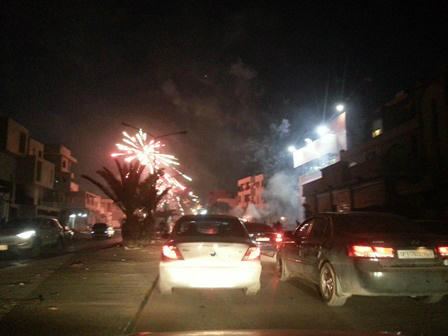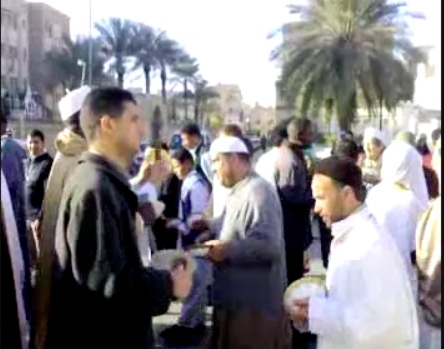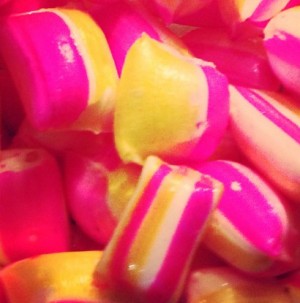By Nihal Zaroug.

Tripoli, January 23, 2013:
The call not to celebrate Mawlid Al-Nabi, the Prophet’s birthday, issued by Dar Al-Iftha appears to have . . .[restrict]fallen on deaf ears in Tripoli. There has been a barrage of fireworks and firecrackers, seen and heard all over the city this evening. If anything the celebrations have been more widespread and noisier than last year.
According to the Libyan news agency LANA, many mosques across the country were celebrating Mawlid with prayers, recitations and speeches stressing the importance of the occasion.
For most of the week, young boys and men have set up street stalls selling all types of fireworks, toys and traditional items such as drums and decorative candleholders known as khamesas, typically bought for girls.

Although it is the eve of the festivities, tonight is celebrated with as much enthusiasms as Mawlid itself. Many meet for a feast of Libyan dishes, followed by lighting of candles and fireworks, an activity that sees the participation of entire families including women.
Mawlid breakfast sees families gather once again and is the highlight for many, as it involves eating asida, a cooked flour pudding served with butter and honey or date syrup. This dish is typically reserved for celebrations due to its decadence.
Traffic around the city will be slow and celebrations carry on well into the night or at least until the last of the fireworks are done. However, more will almost certainly be lit tomorrow as it is a public holiday as well as being the beginning of the weekend.

On Mawlid, street processions known as hadras are typically organised by Sufi lodges and teaching centres (zawias) in different parts of Libya.
In Tripoli, the largest and longest processions start and end in the vicinities of the old city. The most famous hadras are those of Zawia Al-Kabira in Bab Al-Horriya, and Zawia Al-Sagira in Bab Al-Bahr near the arch of Marcus Aurelius.
Although these gatherings are associated with Sufi rituals, many non-Sufis attend to hear the chanting and reciting of religious verses, and this is year in particular, attendance is expected to be high, in defiance of the fatwa issued by Dar Al-Iftha.
For Sufis in Libya, Mawlid is but the beginning of festivities, as several zawias continue to celebrate the birth of the Prophet by organising nightly dhirks (remembrance) and maloufs (a form of music known as Tarab Andalusi) for up to 40 nights, depending on the inclinations of the zawia.
At the end of these observances, pastries made with dried fruits and shakkar sweets are distributed among the community.

[/restrict]








